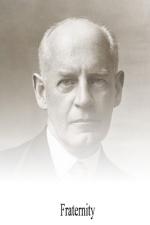The old butler’s heart quavered up into his mouth. He lifted his shaking hand, and put it to his lips, as though to readjust himself.
“Oh yes,” he said; “I ought to ha’ given notice, and took my things away; but there, poor woman, it seemed a-hittin’ of her when she was down. And I don’t want to make no move. I ain’t got no one else that’s interested in me. This woman’s very good about mendin’ of my clothes. Oh dear, yes; she don’t grudge a little thing like that!”
The lame woman hobbled from her post of rest, and began to make the bed with the frown that always accompanied a task which strained the contracted muscles of her leg. “If you don’t help your neighbour, your neighbour don’t help you,” she said sententiously.
Creed fixed his iron-rimmed gaze on her in silence. He was considering perhaps how he stood with regard to Hughs in the light of that remark.
“I attended of his baby’s funeral,” he said. “Oh dear, he’s here a’ready!”
The family of Hughs, indeed, stood in the doorway. The spiritual process by which “Westminister” had gone through life was displayed completely in the next few seconds. ‘It’s so important for me to keep alive and well,’ his eyes seemed saying. ’I know the class of man you are, but now you’re here it’s not a bit o’ use my bein’ frightened. I’m bound to get up-sides with you. Ho! yes; keep yourself to yourself, and don’t you let me hev any o’ your nonsense, ‘cause I won’t stand it. Oh dear, no!’
Beads of perspiration stood thick on his patchily coloured forehead; with lips stiffening, and intently staring eyes, he waited for what the released prisoner would say.
Hughs, whose face had blanched in the prison to a sallow grey-white hue, and whose black eyes seemed to have sunk back into his head, slowly looked the old man up and down. At last he took his cap off, showing his cropped hair.
“You got me that, daddy,” he said, “but I don’t bear you malice. Come up and have a cup o’ tea with us.”
And, turning on his heel, he began to mount the stairs, followed by his wife and child. Breathing hard, the old butler mounted too.
In the room on the second floor, where the baby no longer lived, a haddock on the table was endeavouring to be fresh; round it were slices of bread on plates, a piece of butter in a pie-dish, a teapot, brown sugar in a basin, and, side by side a little jug of cold blue milk and a half-empty bottle of red vinegar. Close to one plate a bunch of stocks and gilly flowers reposed on the dirty tablecloth, as though dropped and forgotten by the God of Love. Their faint perfume stole through the other odours. The old butler fixed his eyes on it.
‘The poor woman bought that,’ he thought, ‘hopin’ for to remind him of old days. “She had them flowers on her weddin’-day, I shouldn’t wonder!” This poetical conception surprising him, he turned towards the little boy, and said “This ’ll be a memorial to you, as you gets older.” And without another word all sat down. They ate in silence, and the old butler thought ’That ‘addick ain’t what it was; but a beautiful cup o’ tea. He don’t eat nothing; he’s more ameniable to reason than I expected. There’s no one won’t be too pleased to see him now!’




